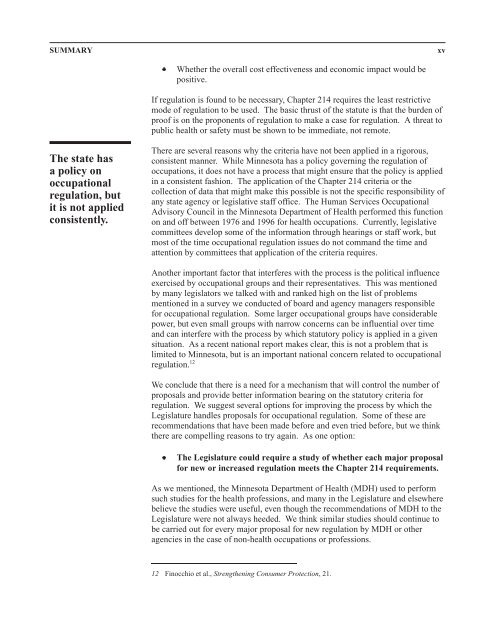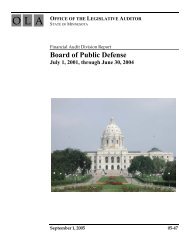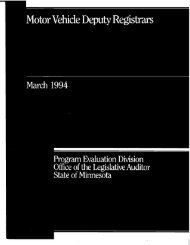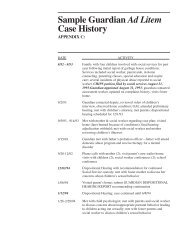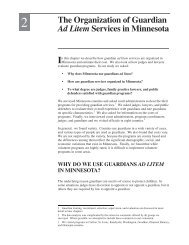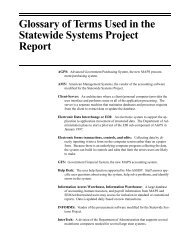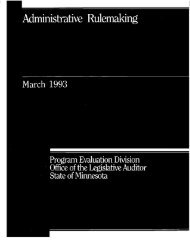Occupational Regulation - Office of the Legislative Auditor
Occupational Regulation - Office of the Legislative Auditor
Occupational Regulation - Office of the Legislative Auditor
Create successful ePaper yourself
Turn your PDF publications into a flip-book with our unique Google optimized e-Paper software.
SUMMARY<br />
xv<br />
· Whe<strong>the</strong>r <strong>the</strong> overall cost effectiveness and economic impact would be<br />
positive.<br />
If regulation is found to be necessary, Chapter 214 requires <strong>the</strong> least restrictive<br />
mode <strong>of</strong> regulation to be used. The basic thrust <strong>of</strong> <strong>the</strong> statute is that <strong>the</strong> burden <strong>of</strong><br />
pro<strong>of</strong> is on <strong>the</strong> proponents <strong>of</strong> regulation to make a case for regulation. A threat to<br />
public health or safety must be shown to be immediate, not remote.<br />
The state has<br />
a policy on<br />
occupational<br />
regulation, but<br />
it is not applied<br />
consistently.<br />
There are several reasons why <strong>the</strong> criteria have not been applied in a rigorous,<br />
consistent manner. While Minnesota has a policy governing <strong>the</strong> regulation <strong>of</strong><br />
occupations, it does not have a process that might ensure that <strong>the</strong> policy is applied<br />
in a consistent fashion. The application <strong>of</strong> <strong>the</strong> Chapter 214 criteria or <strong>the</strong><br />
collection <strong>of</strong> data that might make this possible is not <strong>the</strong> specific responsibility <strong>of</strong><br />
any state agency or legislative staff <strong>of</strong>fice. The Human Services <strong>Occupational</strong><br />
Advisory Council in <strong>the</strong> Minnesota Department <strong>of</strong> Health performed this function<br />
on and <strong>of</strong>f between 1976 and 1996 for health occupations. Currently, legislative<br />
committees develop some <strong>of</strong> <strong>the</strong> information through hearings or staff work, but<br />
most <strong>of</strong> <strong>the</strong> time occupational regulation issues do not command <strong>the</strong> time and<br />
attention by committees that application <strong>of</strong> <strong>the</strong> criteria requires.<br />
Ano<strong>the</strong>r important factor that interferes with <strong>the</strong> process is <strong>the</strong> political influence<br />
exercised by occupational groups and <strong>the</strong>ir representatives. This was mentioned<br />
by many legislators we talked with and ranked high on <strong>the</strong> list <strong>of</strong> problems<br />
mentioned in a survey we conducted <strong>of</strong> board and agency managers responsible<br />
for occupational regulation. Some larger occupational groups have considerable<br />
power, but even small groups with narrow concerns can be influential over time<br />
and can interfere with <strong>the</strong> process by which statutory policy is applied in a given<br />
situation. As a recent national report makes clear, this is not a problem that is<br />
limited to Minnesota, but is an important national concern related to occupational<br />
regulation. 12<br />
We conclude that <strong>the</strong>re is a need for a mechanism that will control <strong>the</strong> number <strong>of</strong><br />
proposals and provide better information bearing on <strong>the</strong> statutory criteria for<br />
regulation. We suggest several options for improving <strong>the</strong> process by which <strong>the</strong><br />
Legislature handles proposals for occupational regulation. Some <strong>of</strong> <strong>the</strong>se are<br />
recommendations that have been made before and even tried before, but we think<br />
<strong>the</strong>re are compelling reasons to try again. As one option:<br />
· The Legislature could require a study <strong>of</strong> whe<strong>the</strong>r each major proposal<br />
for new or increased regulation meets <strong>the</strong> Chapter 214 requirements.<br />
As we mentioned, <strong>the</strong> Minnesota Department <strong>of</strong> Health (MDH) used to perform<br />
such studies for <strong>the</strong> health pr<strong>of</strong>essions, and many in <strong>the</strong> Legislature and elsewhere<br />
believe <strong>the</strong> studies were useful, even though <strong>the</strong> recommendations <strong>of</strong> MDH to <strong>the</strong><br />
Legislature were not always heeded. We think similar studies should continue to<br />
be carried out for every major proposal for new regulation by MDH or o<strong>the</strong>r<br />
agencies in <strong>the</strong> case <strong>of</strong> non-health occupations or pr<strong>of</strong>essions.<br />
12 Finocchio et al., Streng<strong>the</strong>ning Consumer Protection, 21.


